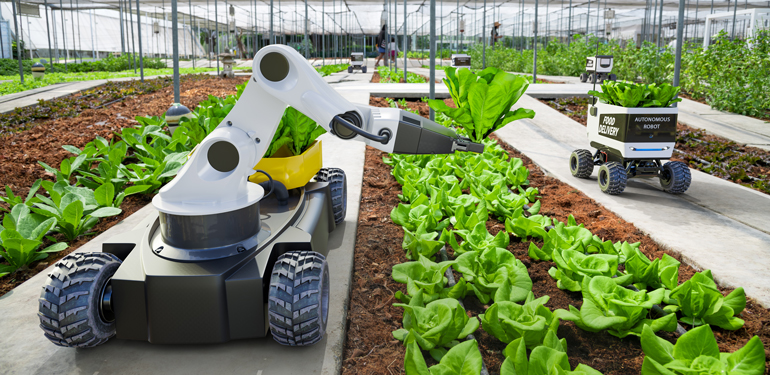Academics / Graduate Study / MS Programs / SpecializationsRobotics and Autonomous Systems
Advancements in artificial intelligence (AI) and computer vision technology have enabled a paradigm shift toward smart robotic and autonomous systems capable of performing complex tasks. Autonomous robots are programmed with AI to recognize and learn from their surroundings and make independent decisions. Self-driving cars, unmanned air vehicles, and autonomous delivery drones are just some of the intelligent systems that are becoming an integral part of contemporary life. Robotics and autonomous systems are impacting manufacturing, transportation, aerospace, defense, healthcare, services, and many other critical applications today. New applications are emerging that will continue to transform and impact everyday life.
In this track, you will acquire skills in robotics and autonomous systems across multidisciplinary domains, including embedded systems, signal processing, control systems, computer vision, artificial intelligence, mechatronics, and much more. Through the intersection of AI, software programming, and hardware design, you will develop the technical skills to build intelligent machines and sophisticated autonomous devices that replicate human behaviors.
Program Details
Core Courses
Select at least six courses from the following list:
- ECE 303 Advanced Digital Design
- ECE 346 Microprocessor System Design
- ECE 347-1 Microprocessor Systems Project I
- ECE 347-2 Microprocessor Systems Project II
- ECE 364, 464 Cyber-Physical Systems Design and Application
- ECE 366, 466 Embedded Systems
- ECE 395, 495 Connected and Autonomous Vehicles: Challenges and Design
- ECE 395, 495 Modeling and Synthesis of Cyber-Physical Systems
- ECE 332 Introduction to Computer Vision
- ECE 360 Introduction to Feedback Systems
- ECE 372-1 Robot Design Studio 1
- ECE 372-2 Robot Design Studio 2
- ECE 373, 473 Deep Reinforcement Learning from Scratch
- ECE 374 Intro to Digital Control
- ECE 375, 475 Machine Learning: Foundations, Applications, and Algorithms
- ECE 390 Intro to Robotics
- ECE 410 System Theory
- ECE 432 Advanced Computer Vision
- ECE 470 Introduction to Nonlinear Control Theory
- ECE 495 Machine Learning and Artificial Intelligence for Robotics
- ECE 495 Robot Design Studio
Elective Courses
Select up to six courses from the following list:
- BME 467 Biomedical Robotics
- ECE 355 ASIC and FPGA Design
- ECE 358 Intro to Parallel Computing
- ECE 361 Computer Architecture I
- ECE 362 Computer Architecture Project
- ECE 387 Real-Time Digital Systems Design and Verification with FPGAs
- ECE 392 VLSI Systems Design Projects
- CS 329 HCI Studio
- CS 330 Human Computer Interaction
- CS 343 Operating Systems
- CS 409 Swarms and Multi-Robot Systems
- CS 410 Quadrotor Design and Control
- CS 469 Machine Learning and Artificial Intelligence for Robotics
- ECE 326 Electronic System Design I
- ECE 327 Electronic System Design II
- ECE 378 Digital Communications
- ECE 380 Wireless Communications
- ECE 395, 495 Geospatial Vision and Visualization
- ECE 422 Random Processes in Communications and Control I
- ECE 423 Random Processes in Communications and Control II
- ECE 495 Game Theory and Networked Systems
- ECE 495 Optimization and Learning in Stochastic Dynamic Environments
- ME 333 Introduction to Mechatronics
- ME 433 Advanced Mechatronics
- ME 449 Robotic Manipulation
- ME 455 Active Learning in Robotics
- ME 495 Sensing Navigation and Machine Learning for Robotics
- ME 495 Embedded Systems in Robotics
- ME 495 Soft Robotics
More in this section
- Artificial Intelligence and Machine Learning
- Computer Vision and Image Processing
- Network and Communication Systems
- Quantum Computing, Sensing & Communications
- Specializations
- Cybersecurity
- Photonics & Optoelectronics
- Embedded Systems
- High-Performance Computing
- Internet-of-Things & Edge Computing
- Semiconductors
- Sustainable Energy and Low-Power Design


